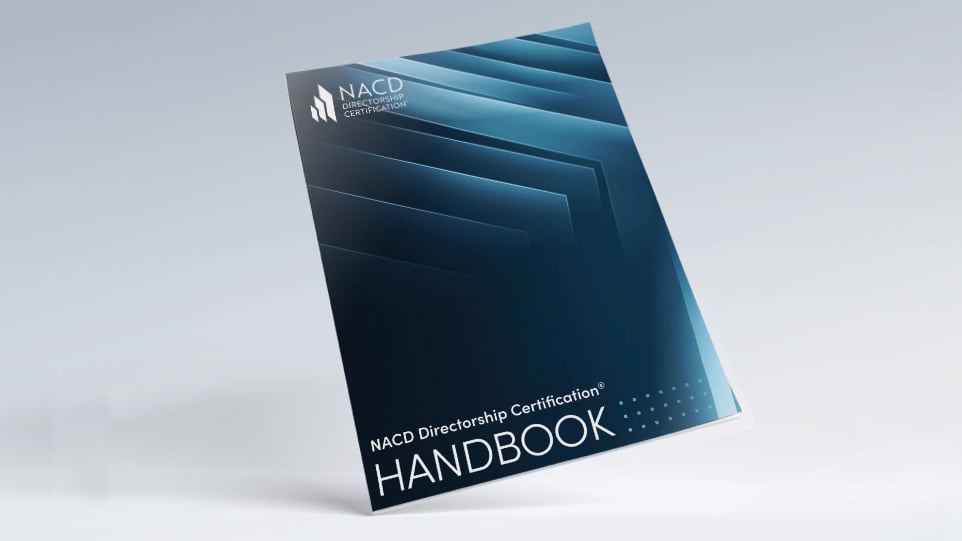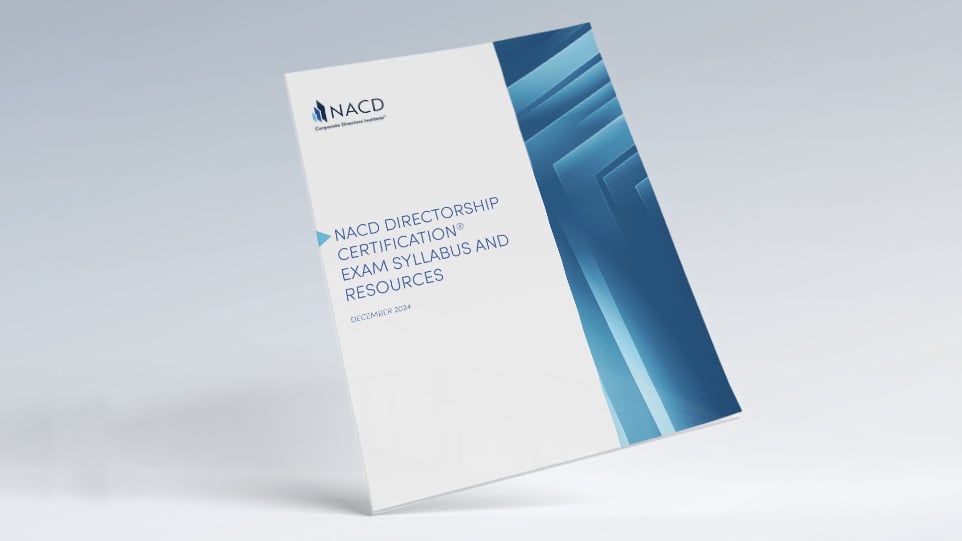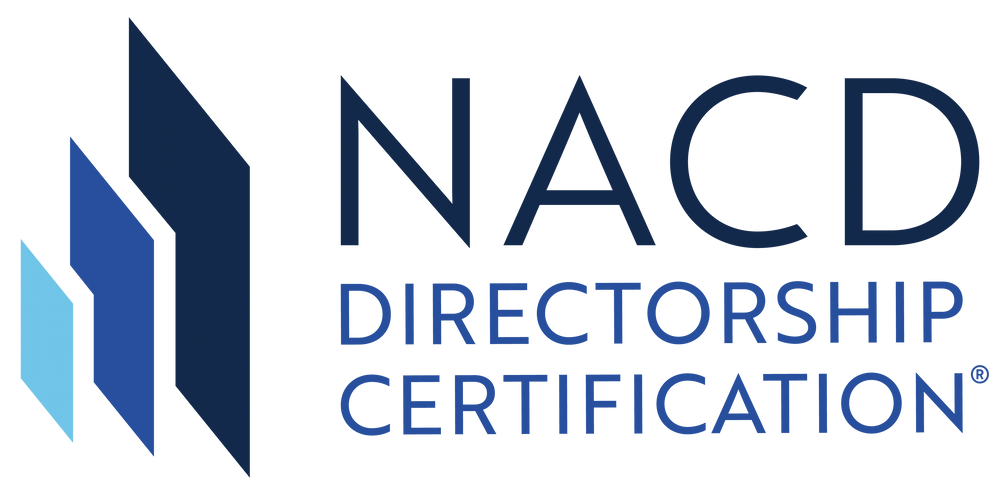Program Details

Login is for current candidates,
applicants and certified directors.
Contact the NACD Credentialing Team
Complete this form or Email Us
Credentialing@nacdonline.org
The critical information you need to get started
Learn more about the NACD Directorship Certification® program, including eligibility, pricing, exam details, and more. For complete and detailed program information download the Candidate Handbook.
The NACD.DC® designation is a mark of accomplishment and a commitment to ongoing professional education. It signals a command of the competencies needed to succeed in the boardroom today and into the future.
Aspiring Directors
Get Board Ready with NACD Accelerate™
For C-suite and senior executives actively seeking their first board role, NACD Accelerate offers a uniquely focused board-readiness path.
Experienced Directors Expedited Path
NACD members who meet any of the following criteria are eligible to bypass the foundation course and go straight to the exam.
- Directors who have previously taken one of the following courses:
NACD Director Professionalism after January 2017, in-person or online
Virtual Director Professionalism®
From Battlefield to Boardroom
If you completed NACD Director Professionalism prior to January 2017, we recommend the Certification Bundle, which includes the most current Virtual Director Professionalism course.
- Directors with three or more years experience on a public, private, or nonprofit board.

NACD Directorship Certification
Program Fees
Most directors benefit from the Certification + Virtual Director Professionalism Bundle.
Non Members Bundle save 15%
Individual Membership + Certification +
Virtual Director Professionalism: $5,400
Members, log-in to see your pricing.
Areas of Competency
NACD’s certification program is designed to update and educate directors with today’s standards and core subject matter. The Study Guide and the Virtual Director Professionalism foundation course provide the depth of information needed to prepare for the exam. Topics include:
The Role of the Board
- Fiduciary Duties
- Corporate Governance Requirements
- Board Processes and Culture
- Shareholder Engagement
The Board’s Standing Committees
- Audit Committee
- Compensation Committee
- Nominating and Governance Committee
The Board’s Duty to Select the CEO
- CEO Succession Planning
- CEO Evaluation
- Executive Compensation
Traditional Areas of Board Oversight
- Oversight of Risk
- Strategy
- Financial Performance
- Mergers and Acquisitions
- Ethics and Compliance
- Talent
- Crises
Emerging Areas of Board Oversight
- Oversight of Culture
- Cyber-Risk Oversight
- ESG (environmental, social, and governance issues)
Preview the NACD Directorship Certification Study Guide.
Download an executive summary and preview the governance topics covered in the Study Guide.

NACD Directorship Certification
The Candidate Handbook
This comprehensive guide is everything you need to know about program policies and procedures, recertification, and more.
Exam Details
Candidates have three opportunities to pass the exam. For details and policies, please refer to the NACD Directorship Certification Candidate Handbook. Download your copy.
Exam Format
Each section of the two-part exam is conducted and timed separately. If you complete Part I with extra time remaining, it cannot be added to the time allowed for Part II. Because both sections are scored together, you will pass or fail the entire exam. The exam takes approximately 4 hours to complete.
Part I: Multiple-Choice, 60 minutes
50 MULTIPLE-CHOICE QUESTIONS. All are presented as a question, followed by four options. Each correct response earns a point; there is no penalty for an incorrect answer.
Part II: Case Studies, 150 minutes
16 Cases. Each case has three or four steps about a situation a corporate director could face. You choose from several possible actions. Each following step gives more information about the case and new answer choices. This section earns points for correct responses and incorrect responses not selected.
Exam Retake Fees
You may take the exam three times. A $250 retake fee is required for both your second and third attempts. Rescheduling rules will apply.
After your first and second unsuccessful tries, you may retest after 30 days. This provides time for you to refresh the subject matter. You are no longer eligible to take the exam if you do not pass on your third try; however, you may reregister for the program after one year.
Exam Scheduling
The NACD Directorship Certification® exam is delivered and proctored by Pearson Vue.
Once identified as eligible to sit for the exam, you’ll receive information from Pearson Vue on registering for and taking the exam. You will have 6 months to sit for your first attempt. You can take the exam in-person or online and should allow approximately 3 hours and 45 minutes to complete the test.
For a demonstration of the testing platform, visit the Pearson Vue OnVue demo site.
OnVUE Online Testing
Before testing, you’ll need to perform a system test using the same computer and location you’ll be using on the exam day. This will check your computer’s readiness, including microphone, Internet speed, and webcam.
For details, or to complete the system test, visit Pearson Vue OnVue.

NACD Directorship Certification® Exam Syllabus
This comprehensive document is your essential guide to navigating the exam launching March 1 with confidence. Whether you're just starting your preparation or refining your focus, the syllabus is designed to help you succeed. Explore a detailed breakdown of the exam domains and key topics covered within each domain.
Exam Specifications and Resources
This document breaks down the content and domains on the current examination. It is an essential guide for your preparation, including helpful resources in each domain.
NACD Directorship Certification
Speak to a Membership Advisor
For questions or help with your application,
email the NACD Credentialing Team.
Exam Cancellation
You may cancel a scheduled examination appointment by contacting Pearson VUE anytime up to 48 hours before your scheduled exam slot. Canceled appointments may be rescheduled within your allowed testing window.
If you miss your appointment, fail to cancel at least 48 hours before your appointment, or arrive more than 30 minutes after your scheduled exam time, you will automatically fail the examination and will need to reschedule your exam appointment for a later date. You will also forfeit your examination fees and pay a fee of $250.00 to reschedule your exam.
You may appeal these charges to NACD in the event of serious circumstances or causes beyond your reasonable control, including, but not limited to, fire or other casualties, an act of God, or a medical emergency.
Test Results
To pass the exam, a candidate’s total point score (total number of points earned) must be greater than the minimum number of points required to pass the exam (the cut score). The cut score is the same for all candidates.
Scaled Scoring
A scaled score is calculated by converting your total point score into a numeric value based on a score-reporting scale for all versions of the same exam.
Candidates must earn a total point score above the cut score to “Pass.” No additional information is available to passing candidates.
Score Reporting
Candidates with a total point score less than the cut score get a “Fail." Additional information about your score margin and weakest subject areas is also provided. Full details are available in the Certification Handbook.
Recertification
Continuous learning is a foundation of the Certification program. Hundreds of in-person and virtual events make it easy to maintain an active NACD.DC status.
Here’s how to enhance your directorship knowledge and stay up to date.
- Earn NACD Credits: Certified Members must earn 32 credits every two years to maintain their status. Your active 24-month recertification cycle begins the day after you pass the exam. Earn credits by attending education events, webinars, or self-directed online courses. Or tap into the education network for more learning opportunities.
- Recertification Fee: A $195 recertification fee is payable every two years. You can submit your recertification payment after you’ve met your credit requirements.
To learn more about maintaining your certification, visit our Certified Members page.
Program Oversight
The NACD Corporate Directors Institute® (CDI), an independent organization, created the NACD Directorship Certification program in consultation with experienced board members.
The CDI confers the NACD.DC® credential on those who meet the eligibility requirements; pass a fair, valid, and reliable exam; adhere to a Code of Ethics and Conduct; and participate in ongoing certification maintenance.



